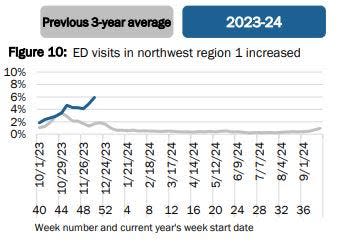Escambia County lands on Florida's flu 'outbreak' list
If you get caught under the mistletoe this holiday season, you may want to think twice before sharing a kiss. Flu hospitalizations are rising across the country and, according to the Florida Department of Health, Florida’s positivity rate for the flu has started to go up, as well.
Individual cases are not reportable in Florida, however the health department does conduct surveillance to identify any unusually severe presentations of flu, detect outbreaks and determine the onset, peak and wane of the flu season.
In the week of Dec. 10-16, Escambia County was among the six Florida counties with a "new outbreak" of flu or influenza-like-illness, according to the health department's weekly Florida Flu Review. Fortunately, the "outbreak" designation is not as dire as it sounds, and is generally defined as two or more individuals showing flu-like symptoms or at least one individual testing positive for influenza in a setting such as a school, daycare, nursing home or long-term care facility.
Dr. William Lindsey, with Baptist Medical Group Primary Group East Hill, says he has already seen several patients with the flu and is seeing more cases this year than he has in the past couple of years.
“In 2020 we had this weird situation where there just wasn’t as many flu cases, but it's kind of come back to the usual pattern it follows,” Lindsey said. “It really tends to peak in December, January, February, but flu season is October all the way to April, so we just recommend all adults get their flu shot.”
In Region 1, comprised of Florida's 10 westernmost counties, the percentage of emergency department visits with a discharge diagnosis of flu saw a relatively sharp increase from late November to mid-December and currently sits about 4% higher than the three-year average, according to the health department's Dec. 10-16 data.

And according to data accumulated by the U.S. Centers for Disease Control and Prevention, up to 7.4 million people in the United States have been infected with the flu this fall. There has also been an estimated 80,000 hospitalizations and 6,800 deaths nationwide from Oct. 1-Dec. 9.
At the same time, COVID-19 also remains a threat. The virus has a new variant, JN.1, that is the fastest-growing strain in the country yet, and it accounts for more than one-fifth of all cases, according to the CDC.
The CDC estimates about 20% of new COVID infections in the U.S. are currently thought to be caused by the coronavirus subvariant JN.1. Currently, 92,586 deaths in Florida since 2020 are attributed to COVID.
Ascension Sacred Heart Hospital reports seeing patients with the flu as well as those with COVID-19, but more are suffering with influenza.
“So far this winter season, December has presented the most influenza cases, but the majority of those have required only outpatient care,” said Alex Miller, marketing and communications specialist with Ascension Florida and Gulf Coast. “While we continue to see positive cases of COVID, they are coming with a particularly low hospital admission rate. In all, the key this winter season is to stay home if you are feeling sick and practice hand hygiene before eating.”
The best way to prevent the spread of the virus is to wash your hands, stay home if you’re sick and avoid those who are sick, according to the Florida Department of Health. Citizens are advised to get the flu shot, especially those who are 65 or older or who have a more severe illness. You can get a flu shot from your doctor or most pharmacies.
For the most part symptoms can be treated with over-the-counter medicine, but people should seek help if symptoms worsen or don’t improve.
“Those are people that you're typically going to want to get on antiviral therapy within that first 48 hours,” Lindsey said. “Anybody that is having trouble breathing or trouble keeping hydrated, those are people that need to go to the hospital and seek care that way, but in general for most people, anybody that's not otherwise high risk, you're going to do symptomatic management, take your Tylenol or your non-steroidal like Aleve or ibuprofen for fever. Use your symptomatic management like your flu and cold over the counter medicines and stay well hydrated.”
For more information, visit the Florida Department of Health’s website.
This article originally appeared on Pensacola News Journal: Escambia in outbreak as flu season takes hold
